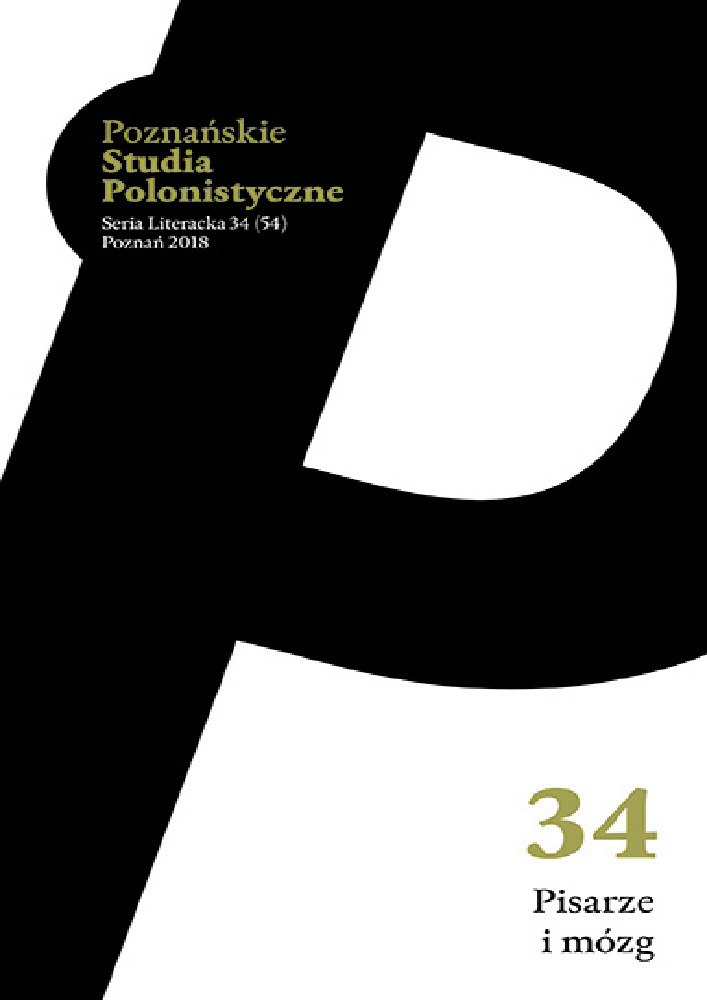Abstract
.References
Armstrong Paul B. (2013), How Literature Plays with the Brain. The Neuroscience of Reading and Art, Johns Hopkins University Press, Baltimore [USA].
Bachmann-Medick Doris (2012), Cultural turns. Nowe kierunki w naukach o kulturze, przeł. Krystyna Krzemieniowa, Oficyna Naukowa, Warszawa.
Bruner Jerome (2006), Kultura, umysł, edukacja, w: tegoż, Kultura edukacji, przeł. Tamara Brzostowska-Tereszkiewicz, Kraków, s. 4-32.
Churchland Patricia S. (2013), Moralność mózgu. Co nauka mówi o moralności, przeł. Mateusz Hohl, Natalia Marek, Copernicus Center Press, Kraków.
Das Manifest. Was wissen und können Hirnforscher heute? (2004), „Gehirn & Geist” [online], [dostęp: 9 czerwca 2018], http://www.gehirn-und-geist.de/manifest.
Dębowski Józef (2014), Antropologia filozoficzna – inspiracje Ingardenowskie dla współczesnych dyskusji z neuronaukami, w: Mózg,umysł, dusza. Spór o adekwatną antropologię, red. Karol Jasiński, Zdzisława Kieliszka, Marian Machinek, Wydawnictwo Wydział Teologii UWM, Olsztyn, s. 161-182.
Habermas Jürgen (2005), Zwischen Naturalismus und Religion. Philosophische Aufsätze, Suhrkamp Verlag, Frankfurt am Main [Niemcy].
Hogan Patrick Colm (2003), The Mind and its Stories: Narrative Universals and Human Emotion, Cambridge University Press, Cambrige [Wielka Brytania].
Holland Norman N. (2009), Literature and the Brain, The PsyArt Foundation, Gainesville [USA].
Ingarden Roman (1971), U podstaw teorii poznania. Część pierwsza, PWN, Warszawa.
Ingarden Roman (1972), O języku i jego roli w nauce, w: tegoż, Z teorii języka i filozoficznych podstaw logiki, PWN, Warszawa, s. 29-119.
Ingarden Roman (1988), O dziele literackim. Badania z pogranicza ontologii, teorii języka i filozofii literatury, przeł. Maria Turowicz, PWN, Warszawa.
Kaufman Mieczysław (1893), Medycyna w powieści, „Prawda”, nr 37, s. 436-437.
Koch Christow (2008), Neurobiologia na tropie świadomości, przeł. Grzegorz Hess, Wydawnictwa Uniwersytetu Warszawskiego, Warszawa.
Penrose Roger (1995), Nowy umysł cesarza. O komputerach, umyśle i prawach fizyki, przeł. Piotr Amsterdamski, Wydawnictwo Naukowe PWN, Warszawa.
Popper Karl Raimund, Eccles John Carew (1977), The Self and Its Brain: An Argument for Interactionism, Springer International, New York [USA].
Przegalińska Aleksandra K. (2016), Istoty wirtualne. Jak fenomenologia zmieniała sztuczną inteligencję, TAiWPN Universitas, Kraków.
Schrott Raoul, Jakobs Arthur (2011), Gehirn und Gedicht. Wie wir unsere Wirklichkeiten konstruieren, Carl Hanser Verlag, München [Niemcy].
Thompson Evan, Stapleton Mog (2009), Making Sense of Sense-Making. Reflections on Enactive and Extended Mind Theories, „Topoi”, nr 28, s. 23‑30.
Turner Mark (1999), The Literary Mind: The Origins of Thought and Language, Oxford University Press, New York [USA].
Turner Victor (1977), Process, System and Symbol. A New Anthropological Synthesis, „Daedalus”, vol. 106, nr 3, Discoveries and Interpretations: Studies in Contemporary Scholarship, s. 61-80.
Ulicka Danuta (2016), Tematy kulturowe w polskim literaturoznawstwie teoretycznym. Przypadek referencji albo Roman Ingarden dla początkujących i dla zaawansowanych, „Zagadnienia Rodzajów Literackich”, t. 59, z. 4, s. 9-33 [online], [dostęp: 9 czerwca 2018], cejsh.icm.edu.pl.
Varela Francisco (2010), Neurofenomenologia. Metodologiczne lekarstwo na trudny problem, przeł. Robert Poczobut, „Avant”, nr 1, s. 31-73.
License
Authors
Authors of texts accepted for publication in „Poznańskie Studia Polonistyczne. Seria Literacka” are required to complete, sign and return to the editor's office the Agreement for granting a royalty-free license to works with a commitment to grant a CC sub-license.
Under the agreement, the authors of texts published in „Poznańskie Studia Polonistyczne. Seria Literacka” grant the Adam Mickiewicz University in Poznań a non-exclusive, royalty-free license and authorize the use of Attribution-NoDerivatives 4.0 International (CC BY-ND 4.0)Creative Commons sub-license.
The authors retain the right to continue the free disposal of the work.
Users
Interested Internet users are entitled to use works published in „Poznańskie Studia Polonistyczne. Seria Literacka” since 2016, for non-commercial purposes only, under the following conditions:
- attribution - obligation to provide, together with the distributed work, information about the authorship, title, source (link to the original work, DOI) and the license itself.
- no derivatives - the work must be preserved in its original form, without the author's consent it is not possible to distribute the modified work, such as translations, publications, etc.
Copyrights are reserved for all texts published before 2016.
Miscellaneous
Adam Mickiewicz University in Poznań retains the right to magazines as a whole (layout, graphic form, title, cover design, logo etc.).
